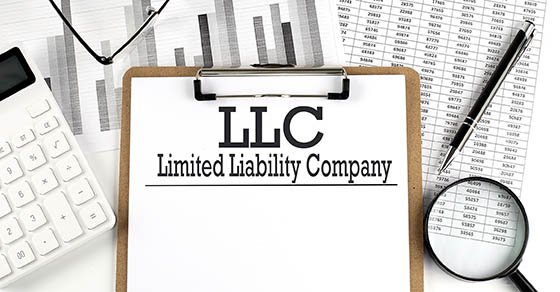Why an LLC Might Be the Best Choice of Entity for Your Business
- Learn about the duality of benefits owning an LLC can provide.
- Discover the tax benefits of having your LLC treated as a partnership.
The business entity you choose can affect your taxes, your personal liability, and other issues. A limited liability company (LLC) is somewhat of a hybrid entity. Owners can structure it to resemble a corporation for owner liability purposes and a partnership for federal tax purposes. This duality may provide you with the best of both worlds.
Like the shareholders of a corporation, the owners of an LLC (called “members” rather than shareholders or partners) generally aren’t liable for business debts except to the extent of their investment. Thus, they can operate the business knowing that their personal assets are protected from the entity’s creditors. This protection is far greater than that afforded by partnerships. In a partnership, the general partners are personally liable for the debts of the business. Even limited partners, if they actively participate in managing the business, can have personal liability. Be sure to check with an attorney before you choose an entity as there are always exceptions. For example, many lenders understand the liability protection and will insist that members agree to a personal guarantee or pledge personally owned property.

Check-the-box rules for LLC owners
Multi member LLC owners can choose to have the entity treated as a partnership for federal tax purposes rather than elect to have the entity taxed as a regular corporation. This can provide a number of significant benefits to them. For example, partnership earnings aren’t subject to an entity-level tax. Instead, they “flow-through” to the owners, in proportion to the owners’ respective interests in profits. Owners report them on their individual returns and are taxed only once. To the extent the income passed through to you is qualified business income, you’ll be eligible to take the Section 199A pass-through deduction, subject to various limitations.
In addition, since you’re actively managing the business, you can deduct on your individual tax return your ratable shares of any losses the business generates. This, in effect, allows you to shelter other income that you (and, if married, your spouse) may have. The downside of the business being taxed as a partnership is that members active in the business will be subject to self-employment tax. An S corporation's members are not subject to self-employment tax, but are subject to paying reasonable compensation that is subject to payroll tax.
An LLC that’s taxable as a partnership can provide special allocations of tax benefits to specific partners. This can be an important reason for using an LLC over an S corporation (a form of business that provides tax treatment that’s similar to a partnership). Another reason for using an LLC over an S corporation is that LLCs aren’t subject to the restrictions the federal tax code imposes on S corporations regarding the number of owners and the types of ownership interests that may be issued.
Explore the options
In summary, an LLC may give you corporate-like protection from creditors while providing you with the benefits of taxation as a partnership. Be aware that the LLC structure is allowed by state statute and states may use different regulations. Want to discuss in more detail how the use of an LLC might benefit you and the other owners? Call Fiducial at 1-866-FIDUCIAL or make an appointment at one of our office locations to discuss your situation.
Ready to book an appointment now? Click here. Know someone who might need our services? We love referrals!
For more small business COVID-19 resources, visit Fiducial’s Coronavirus Update Center to find information on SBA loans, tax updates, the Paycheck Protection Program, and paid sick and family leave.









